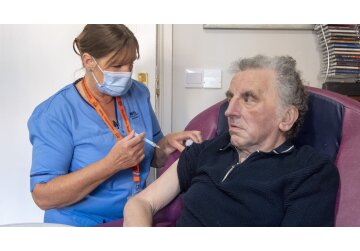
Blood test could identify long-COVID risk and allow early intervention
If the experimental test is validated by further research it may result in people at high risk of long-COVID being given anti-viral treatments in the hope of preventing debilitating symptoms.
A blood test done while people have COVID could predict whether they're likely to develop long-term health problems, a new study suggests.
If the experimental test is validated by further research it may result in people at high risk of long-COVID being given anti-viral treatments in the hope of preventing debilitating symptoms.
Researchers at University College London compared levels of more than 90 blood proteins in 54 healthcare workers with COVID and a control group of healthy staff.
They found several proteins were dramatically disrupted for up to six weeks, even in those with mild symptoms, according to results published in the journal Lancet eBioMedicine.
Twenty of them were predictive of persistent symptoms a year later. Most were linked to anti-clotting and anti-inflammatory processes.
The researchers then used an artificial intelligence (AI) algorithm to scan proteins in the blood samples - and successfully identified the 11 infected health workers who developed long-COVID.
Dr Wendy Heywood, one of the senior researchers from UCL's Great Ormond Street Institute of Child Health said: "If we can identify people who are likely to develop long-COVID, this opens the door to trialling treatments such as antivirals at this earlier, initial infection stage, to see if it can reduce the risk of later long-COVID."
Kevin McConway, Emeritus Professor of Applied Statistics at The Open University, said the blood test would need to be validated in a larger study to be sure the AI algorithm worked properly.
"While their prediction tool certainly looks quite promising, this research can't provide enough evidence that it can work in a wider context," he said.
"All the data in this study comes from the first wave of the COVID pandemic, before new virus variants emerged and before vaccines were developed - and when the participants, who were all health care workers, were subject to a quite specific set of conditions in their work and in the country generally."
zf.ro







